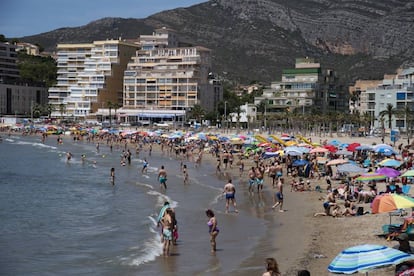Tourism replaces construction as Spain’s main employment driver
More than two million people are employed by the sector but many are on temporary contracts

Tourism has been one of the main engines behind Spain’s economic recovery and it is now the most important source of employment. According to a survey by the Spanish Institute of Tourism (Turespaña), 2.65 million people – 2.17 million waged workers and 483,861 private contractors – were employed in the sector in spring. This represents 13.7% of Spain’s working population (19.34 million people), meaning tourism has overtaken construction as the top employer sector in the country.
13.7% of Spain’s working population is employed by the tourism sector
Indeed, employment in tourism has reached nearly the same level as employment in construction during Spain’s property boom. In 2007, when the property bubble was about to burst, 2.7 million people were working in construction, according to the country’s National Statistics Institute (INE). The working population at that time, however, was 20.5 million people, meaning construction accounted for 13.1% of all employment.
With record-high numbers of tourists visiting Spain, the demand for workers in the tourism sector has been steadily rising. According to Turespaña, more than 2.2 million people were employed in tourism in the second trimester of 2014. Four years later that figure is now 2.6 million – a rise of nearly 20%. The tourism boom has pushed the service sector to its highest level yet with 75.5% of Spain’s working population employed in a service-related industry.
Low salaries
Tourism may have replaced construction as Spain's main employment driver but it cannot compete when it comes to salaries. According to a study by the INE, the average annual salary of a construction worker in 2008 was €20,706.7 – 48% more than the €14,000 received by an average hospitality worker.
In 2016, the last year with available data, hospitality workers were earning €14,125.3 – just 1.2% more. Salaries in construction meanwhile have risen 7% to €22,163.46. Hospitality employees were paid an average of €9.32 an hour in the first semester of 2018, while construction workers received €11.73 an hour.
The downside is that a large amount of available work in the tourism sector is temporary due to its seasonal nature. Between April and May, 35.2% of all salaried workers in the industry were on a limited term contract – 9.6 percentage points more than the average worker in the service industry and almost 8.5 percentage points more than the average worker across all industries in the Spanish labor market.
The seasonality of tourism means employment in the sector fluctuates greatly between summer and winter. In the first trimester of 2017, more than 2,660,915 people were working in the tourism sector; three months later that figure had dropped by 141,000 and by the first semester of 2018, there were 240,000 fewer workers.
Over the past year, the number of people working in tourism on an indefinite contract grew by 6.7%, compared to the 2.7% rise in temporary workers. While 35.2% of tourism workers were working on a temporary basis in spring, this is almost one percentage point less than the same period last year.
Catalonia is the region that receives the highest number of tourists in Spain, with 19 million foreigners and five million Spaniards visiting the region in 2017, according to the INE. It is also the region that employs the greatest number of tourism workers, with 457,944 people employed in the sector in the second trimester of this year. Andalusia comes in second place with 433,853 workers – a 7.5% increase upon last year’s figures from the same period. Although Madrid receives fewer visitors than the Balearic and Canary Islands, it has more people working in tourism – 400,000 compared to 169,000 and 244,000, respectively.
English version by Melissa Kitson.
Tu suscripción se está usando en otro dispositivo
¿Quieres añadir otro usuario a tu suscripción?
Si continúas leyendo en este dispositivo, no se podrá leer en el otro.
FlechaTu suscripción se está usando en otro dispositivo y solo puedes acceder a EL PAÍS desde un dispositivo a la vez.
Si quieres compartir tu cuenta, cambia tu suscripción a la modalidad Premium, así podrás añadir otro usuario. Cada uno accederá con su propia cuenta de email, lo que os permitirá personalizar vuestra experiencia en EL PAÍS.
¿Tienes una suscripción de empresa? Accede aquí para contratar más cuentas.
En el caso de no saber quién está usando tu cuenta, te recomendamos cambiar tu contraseña aquí.
Si decides continuar compartiendo tu cuenta, este mensaje se mostrará en tu dispositivo y en el de la otra persona que está usando tu cuenta de forma indefinida, afectando a tu experiencia de lectura. Puedes consultar aquí los términos y condiciones de la suscripción digital.








































